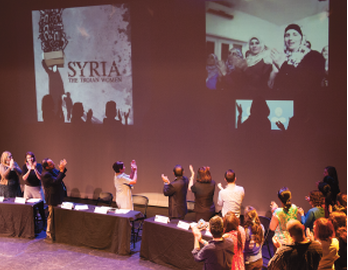The following essay was originally published by The Huffington Post on March 6, 2017. An excerpt is reposted here with permission.
—
Co-authored with Dr Yasmine Van Wilt, Fellow of the Royal Society of Arts, Mellon Fellow at Union College, Kobalt/AWAL singer-songwriter, dramatist, academic, and contributor to
Arianna Huffington’s Thrive Global.
This is the third of a series of interviews with extraordinary people who are working in partnership with or using their skills and training as artists and humanists to improve their communities, challenge assumptions, and advance our understanding of the human condition.
Dr. Kathleen M. Pike is Executive Director and Scientific Co-Director of the Global Mental Health Program and is Associate Director of the Health and Aging Policy Fellowship Program at the College of Physicians and Surgeons at Columbia University. She is also Supervising Psychologist in the Eating Disorders Program at NYSPI. Dr. Pike has provided consultation on mental health policy to Japanese Parliamentary Representatives. Dr Pike has conducted pioneering work in the area of risk factors for eating disorders, and she has developed a widely-disseminated treatment program for anorexia nervosa that has demonstrated effectiveness in multiple clinical studies.
Dr. Pike actively consults to programs around the world on the implementation of evidence-based treatment for eating disorders and has received awards for her clinical service and teaching. She recently served as consultant to the American Psychiatric Association DSM-5 task force on cultural factors associated with the clinical presentation and risk factors of eating disorders. She also serves on the Feeding and Eating Disorders Working Group for the World Health Organization revision of the International Classification of Diseases. Watch her TedX Tokyo Talk “Don’t Call Me Crazy”:
YVW: How did you forge your path?
I started out as an undergraduate interested in understanding different cultures. I was actually an international studies major as an undergrad. I thought that I would pursue a career that was explicitly focused on foreign service or international policy within the world of political governance, but the further I delved into this, the clearer it was that what really fascinated me was the people I met…and my desire to understand these stories led me to a desire to understand and rationalize the human condition. So I went on to study psychology because it allowed me to develop a theoretical framework for examining the human condition.
At this point in my career, I am now able to bring these two passions together. I am now able to examine how people who struggle with illness are made vulnerable…because of the diseases that affect them and because of the relationship between the cultures of states and nations and how these crises are negotiated. So this is helping me to promote health, to reduce stigma and to promote a broader embrace of the wide range of human experiences. Virtually all people will experience or be impacted by mental illness…either through personal experience or through proximity with someone who is suffering. We know that 1 in 4 people experiences a mental health challenge in a lifetime. Looking at the simple math of the family nucleus…within one arm’s length, we will come into proximity with someone who is suffering in their lifetime.
And through my collaboration with the arts and artists, I have come to realize how poorly understood mental health really is. There are so many myths and misperceptions, and so in an effort to engage a broader segment of the population around these issues, I have increasingly expanded my commitment and interest in engaging the arts….the arts bring voices to experiences that must be articulated…
For the complete interview, please see The Huffington Post article here.
